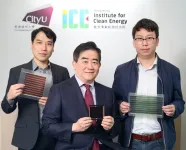(Press-News.org) A recent review in the journal Sustainable Microbiology discusses how the use of biocides can promote well-being - but must only be used when there are clear benefits.
Biocide use should be restricted to applications where there are tangible benefits but also not unnecessarily restricted where genuine benefits can be demonstrated, the new review suggests.
The article ‘Sustainable application of biocides to promote hygiene and minimise antimicrobial resistance’ by scientists at the University of Manchester, UK, is published in Sustainable Microbiology, an Applied Microbiology International publication.
Contribution to sustainability
“We aimed to present an objective assessment of the potential contribution of microbiocides - widely used non-antibiotic antimicrobials - to sustainability,” explained corresponding author Professor Andrew McBain.
“Having been involved in biocide research since 1999, I am aware of the need for a better understanding of the potential benefits of appropriate biocide use, as well as the generation of data on which to base improved risk assessment.”
Biocidal (microbicidal) products play a critical role in controlling microorganisms in healthcare, industrial, community and home environments but there is concern that their use and misuse might contribute to the evolution of antimicrobial resistance (AMR).
Microbial control
Benefits of biocides include the control and prevention of infections in clinical settings with associated reductions in antibiotic use, preservation of a range of products and materials, substantial reduction in infection risk for consumers, hygiene in the community, such as in public swimming baths, and microbial control in many facets of industry.
“Antibiotic resistance is widely understood to be one of humankind’s largest challenges. Biocides are one of a limited number of tools we have to reduce the need for antibiotic use, which most people would agree is a major driver of AMR,” Professor McBain said.
“Yet at the same time, there is concern that biocides, particularly when used inappropriately, could contribute to AMR. This potential contribution, however, remains poorly understood. Risk assessments are often based on data that we believe do not always best represent the way biocides are used in the real world and should fully consider benefits as well as risks.”
Critical assessment
The review provides a critical assessment of the contribution of biocides to sustainability based on a critical evaluation of the literature, followed by offering views on the future management of biocide use across the globe.
“I would not claim that the work represents a paradigm shift in thinking on the topic, but I do believe that there should be more balanced consideration of risks and benefits in the context of biocides, as well as a push for more realistic data on which to estimate risk,” Professor McBain said.
“More work is needed to develop a reliable basis for appropriate biocide use. This will encompass research in microbiology and biophysics (where we have been developing collaborations), chemistry, formulation, regulation, and education.”
Joined-up approach
“A joined-up approach with industry stakeholders is required to ensure that effective products are available when needed and that their use is appropriately regulated but not unnecessarily restricted.”
While the review was a team effort, Thomas Willmott drove the writing, and it also formed part of the PhD project of Layali Jadaan. It was supported by microbiologist Gavin Humphreys, and biophysics collaborator Jian Lu.
“Importantly, I contacted a US-based microbiologist and biocide specialist, John Chapman who helped considerably. John became a friend and mentor after we were introduced in the early 2000s by my late colleague Peter Gilbert,” Professor McBain said.
‘Sustainable application of biocides to promote hygiene and minimise antimicrobial resistance’ is published in Sustainable Microbiology.
NOTES TO EDITORS
Applied Microbiology International (AMI) is the oldest microbiology society in the UK and with more than half of its membership outside the UK, is truly global, serving microbiologists based in universities, private industry and research institutes around the world. AMI provides funding to encourage research and broad participation at its events and to ensure diverse voices are around the table working together to solve the sustainability development goals it has chosen to support. AMI publishes leading industry magazine, The Microbiologist, and in partnership with Oxford University Press, publishes three internationally acclaimed journals. It gives a voice to applied microbiologists around the world, amplifying their collective influence and informing international, evidence-based, decision making.
Oxford University Press (OUP) is a department of the University of Oxford. It furthers the University's objective of excellence in research, scholarship, and education by publishing worldwide. OUP is the world's largest university press with the widest global presence.
OUP publishes more than 500 academic and research journals covering a broad range of subject areas, two-thirds of which are published in collaboration with learned societies and other international organizations. It has been publishing journals for more than a century and, as the world’s largest university press, has more than 500 years of publishing expertise. END
Biocides are a useful tool to combat antibiotic resistance but appropriate use is vital, scientists suggest
2024-08-08
ELSE PRESS RELEASES FROM THIS DATE:
Wide genetic diversity in South American indigenous groups highlights diversity gap in genomics research
2024-08-08
Amazonians are as genetically different from Andeans as Europeans are from East Asians when it comes to genetic variants that affect the response to certain drugs, according to a commentary published August 8 in the journal Cell. These genetic variations can affect what side effects an individual experiences and influence drug dosage recommendations. Taking the genetic diversity within indigenous groups as an example, the scientists highlight the need to address the diversity gap in genomics research.
Historically, Native American populations have been viewed as ...
Increasing clinicians’ knowledge about climate change’s impact on health and healthcare sustainability
2024-08-08
Physicians at an academic medical center completed surveys about climate change-focused educational modules related to health and sustainability in healthcare offered through an existing biannual quality incentive program.
Most respondents thought that the modules were relevant or very relevant to their lives and clinical practices, and that their knowledge on these topics increased after completing the modules.
Perceptions of the modules’ relevance varied by physicians’ demographics and specialties.
An educational program emphasizing the relationship that climate change has with health and health care environmental sustainability was well-received by physicians, according ...
Common antibiotics carry small but serious risks of life-threatening drug reactions, but some are safer than others
2024-08-08
Toronto, ON, May 15, 2024 – Two classes of commonly prescribed oral antibiotics are associated with the greatest risk for severe drug rashes that can lead to emergency department visits, hospitalizations and even death, according to a new study.
Researchers from ICES, Sunnybrook Research Institute and the Department of Medicine at the University of Toronto’s Temerty Faculty of Medicine suggest that prescribers should consider using lower-risk antibiotics for their patients when clinically appropriate.
Serious cutaneous adverse drug reactions (cADRs), or severe drug rash, are ...
Oral antibiotics and risk of serious cutaneous adverse drug reactions
2024-08-08
About The Study: Commonly prescribed oral antibiotics are associated with an increased risk of serious cutaneous adverse drug reactions compared with macrolides, with sulfonamides and cephalosporins carrying the highest risk. Prescribers should preferentially use lower-risk antibiotics when clinically appropriate.
Corresponding Author: To contact the corresponding author, David N. Juurlink, M.D., Ph.D., email david.juurlink@ices.on.ca.
To access the embargoed study: Visit our For The Media website at this link https://media.jamanetwork.com/
(doi:10.1001/jama.2024.11437)
Editor’s Note: Please ...
Cannabis use and head and neck cancer
2024-08-08
About The Study: This cohort study highlights an association between cannabis-related disorder and the development of head and neck cancer in adult patients. Given the limitations of the database, future research should examine the mechanism of this association and analyze dose response with strong controls to further support evidence of cannabis use as a risk factor for head and neck cancers.
Corresponding Author: To contact the corresponding author, Niels C. Kokot, MD, email niels.kokot@med.usc.edu.
To ...
Childhood and adolescent depression symptoms and young adult mental health and psychosocial outcomes
2024-08-08
About The Study: In this cohort study of Canadian children and adolescents, childhood and adolescent depression symptoms were associated with impaired adult psychosocial functioning. Interventions should aim to screen and monitor children and adolescents for depression to inform policymaking regarding young adult mental health and psychosocial outcomes.
Corresponding Author: To contact the corresponding author, Marilyn N. Ahun, PhD, email marilyn.ahun@mcgill.ca.
To access the embargoed study: Visit our For The Media website at this link https://media.jamanetwork.com/
(doi:10.1001/jamanetworkopen.2024.25987)
Editor’s ...
Berkeley ordinance replaced junk food in store checkouts
2024-08-08
Parents shopping with their children in Berkeley, California, can now breathe a sigh of relief when they get to the checkout lane. Likewise, Berkeley shoppers looking for an impulse snack purchase now have healthy options at the checkout. That is because in March 2021, Berkeley became the world’s first city to implement a healthy checkout policy, which sets nutritional standards for store checkouts. Berkeley, located in the San Francisco Bay Area, has been followed by Perris, a small city in Southern California, as well the United Kingdom.
According to Berkeley’s policy, only the following products can be placed at checkout: ...
Cannabis use tied to head and neck cancer
2024-08-08
LOS ANGELES — A study from the USC Head and Neck Center, part of Keck Medicine of USC and the USC Caruso Department of Otolaryngology – Head and Neck Surgery, suggests that cannabis, the most commonly used illicit substance worldwide, is associated with an increased occurrence of head and neck cancer.
A large, multicenter study published in JAMA Otolaryngology – Head & Neck Surgery revealed that adults with cannabis dependence, known as cannabis use disorder, are 3.5 to 5 times more likely to develop head and neck cancer than those who do not use the substance.
“This ...
Kamikaze drones built at KTU in Lithuania are sent to Ukraine
2024-08-08
KTU M-Lab, the Centre of Experimental and Prototyping Laboratories at Kaunas University of Technology, Lithuania, in cooperation with the company Nando Droid, is constructing first-person view (FPV) kamikaze drones, which are being sent to Ukraine and used in the war field. These drones are fitted with explosives that are activated when they hit an obstacle.
Kaunas University of Technology students assembling the drones say that they are built to have a long flight range and the ability to carry a large payload.
“The war in Ukraine is already being called a drone war. Without them, this war would be unimaginable. It saves many lives,” says the representative ...
Scalable production of next-generation high-performance printable solar cells
2024-08-08
As climate change continues to advance, the need for low-carbon, clean energy alternatives has become more urgent than ever. A research team at City University of Hong Kong (CityUHK) has developed a new generation of printable perovskite solar cells that offer higher efficiency and stability, lower cost and scalability, with a minimal carbon footprint. With funding support from the inaugural Research, Academic and Industry Sectors One-plus Scheme (RAISe+ Scheme) of the Innovation and Technology Commission of the HKSAR government, the team aims to establish ...



